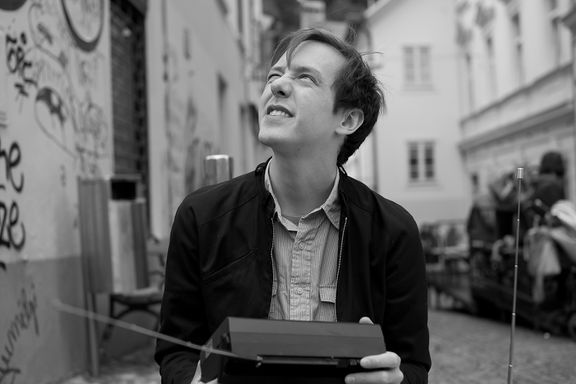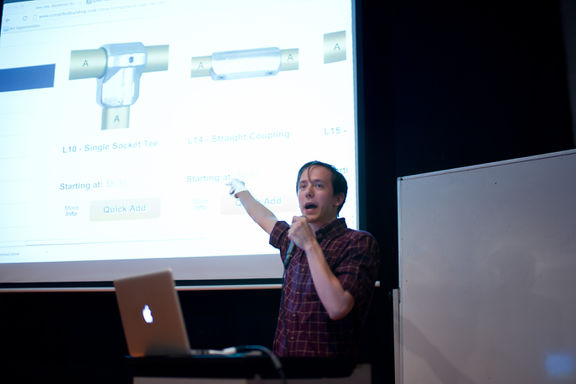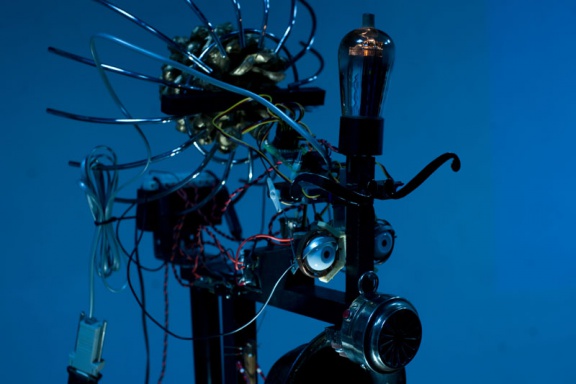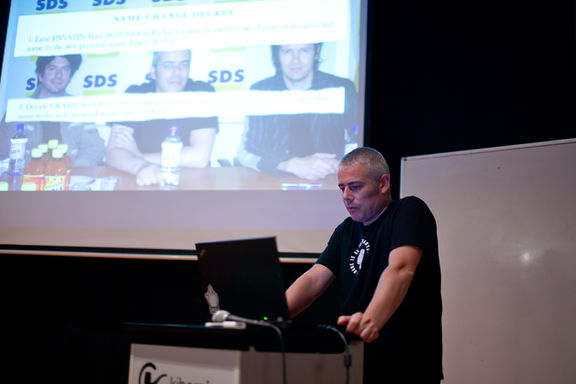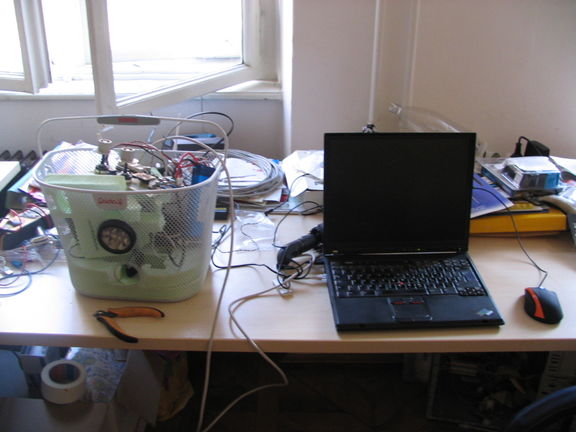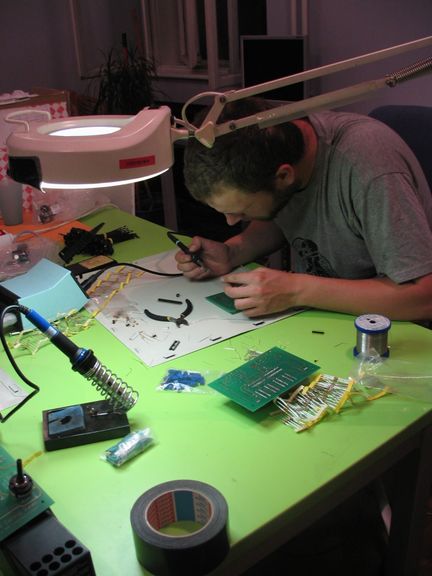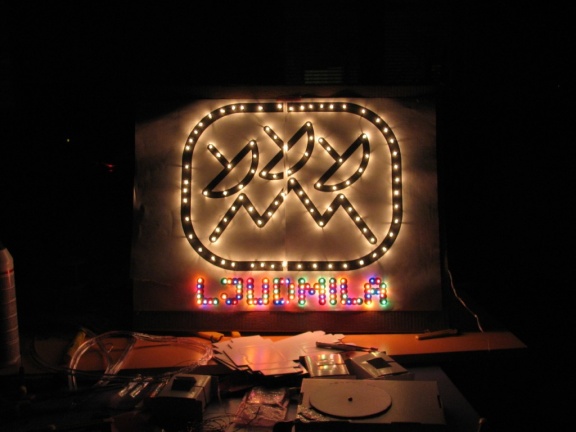Depot:Ljudmila - Ljubljana Digital Media Lab
Archival article
Ljudmila - Ljubljana Digital Media Lab is an open-access digital media laboratory with extensive experience since 1994 in connecting new media technologies and artistic projects as well as encouraging broader, savvier, and more creative uses of new technologies.
In 2011 the City Art Gallery Ljubljana organised a retrospective exhibition Powered by Ljudmila, which comprised several interviews with the principal Ljudmila cofounders, associates, and collaborators and a line of documents testifying to seventeen years of events, projects, and actions, and its interaction in Slovenia and internationally.
The exhibition Real Time Settings for Ner[d/ve]s at ŠKUC Gallery presented programme based media art linked to responsive technologies, eight projects recently produced by Ljudmila lab and its network of international collaborators. In autumn 2012 Ljudmila collaborated with Medialab-Prado (Spain) and the SGMK (Switzerland) in conceiving and organising Interactivos?’12 Ljubljana: Obsolete Technologies of the Future, a workshops in collaborative prototyping.
Background and mission
Ljudmila - Ljubljana Digital Media Lab was initiated in 1994 by a group of new media artists and activists living and working in Ljubljana (including Vuk Ćosić and Marko Peljhan) within the new media programme at the Open Society Institute – Slovenia. Since 2001, and up to 2014, the Ljudmila programme of the MMC has operated in the framework of KUD France Prešeren.
Ljudmila - Ljubljana Digital Media Lab was led by Mitja Doma, Amra Bakšić (1997–1998), Špela Kučan (1999–2009) and Luka Frelih since 2009. Robertina Šebjanič led and coordinated the art and education programme in the period 2008–2012.
First the Ljudmila was housed in the dislocated premises of the high school Gimnazija Šentvid on the periphery of Ljubljana, then in 2005 it was moved to Rimska 8 in the very centre of Ljubljana. A well-equipped digital media lab has focused on digital production as well as education, research and development of hardware and software. It also provided knowledge, equipment, Internet access, server space, electronic publishing and other affordable networking services to non-governmental and non-profit organisations, art collectives, active individuals, and others. In 2004, for its work as the Slovene epicentre of digital creation for group projects and autonomous artists and researchers, Ljudmila was bestowed the Golden Bird Award for the section of new media.
Projects
The project Frida V. was conceived by a media artist and programmer Luka Frelih and developed in cooperation with V2_, Institute for the Unstable Media (Rotterdam) and plenty of other supporters and funders. Frida V. (Free Ride Data Acquisition Vehicle) is a free, mapping interface for bicycles that he first built for DEAF 2004 and has since been developing further. The rugged and comfortable bicycle equipped for efficient exploration and mapping of public urban spaces that carries a small computer, a GPS positioning device, an 802.11 wireless network transceiver, and a basic audiovisual recording unit, has been realised and presented in numerous cities all over the world: Ljubljana, Rotterdam, New York, Munich, Bergen, Beijing, etc. In 2009 a new all-in-1 Frida Box prototype series was developed, built, and test-ridden in Paris, France. In the beginning of 2010, Frida V. was exhibited within the exhibition Three Electromagnetic Habitats in the KiBela Art Space. The project was presented also at the Tactics and Practice: New Media Drivers pilot seminar for new media arts produced by Aksioma Institute in Ljubljana in June 2010.
Robertina Šebjanič, a video and new media artist, developed at Ljudmila lab several interactive installations, e.g. Pufination (2008, co-author Luka Frelih), which was presented at KIBLA Multimedia Centre in Maribor and the Device_art 3.009 festival in Zagreb, and Futuro Autopoiesis (2010). She collaborates with biochemist and molecular biologist Špela Petrič on artistic and research project Towards the Human Spore, considering an alternative, constructed evolution of the human species and future scenarios involving the humalga.
Since 2011 ∆ Lacanoid, a simulation of human-like presence has been developed by Žiga Kranjec, Igor Križanovskij and Urban Belina. A concept prototype Lacanoid 1 was presented at the MKC Maribor Youth Culture Centre.
The exhibition Real Time Settings for Ner[d/ve]s conceived by Robertina Šebjanič, Tevž Logar and Ida Hiršenfelder took place at ŠKUC Gallery in Ljubljana, featuring recent projects produced by Ljudmila art production section and some guest projects: Base 8 by artist Chris Sugrue (USA), Fiction and Loss by visual artist Mirjana Batinić and developer Zoran Obradović (HR/SI), ∆ Lacanoid and the Karpetbeest by Luka Frelih, Time is Money by Domestic Research Society (SI), and LUMEN - Drawing in augmented reality by Dominik Mahnič and Matic Potočnik (SI), BLOWER by Markus Decker, Karl Heinz Jeron and Us(c)hi Reiter (IT/AT/DE) and Whatever Dance Toolbox by BADco. and Daniel Turing (HR/DE). The exhibition catalogue was written collaboratively during Book Sprint event, using booki.cc free software for publishing on demand.
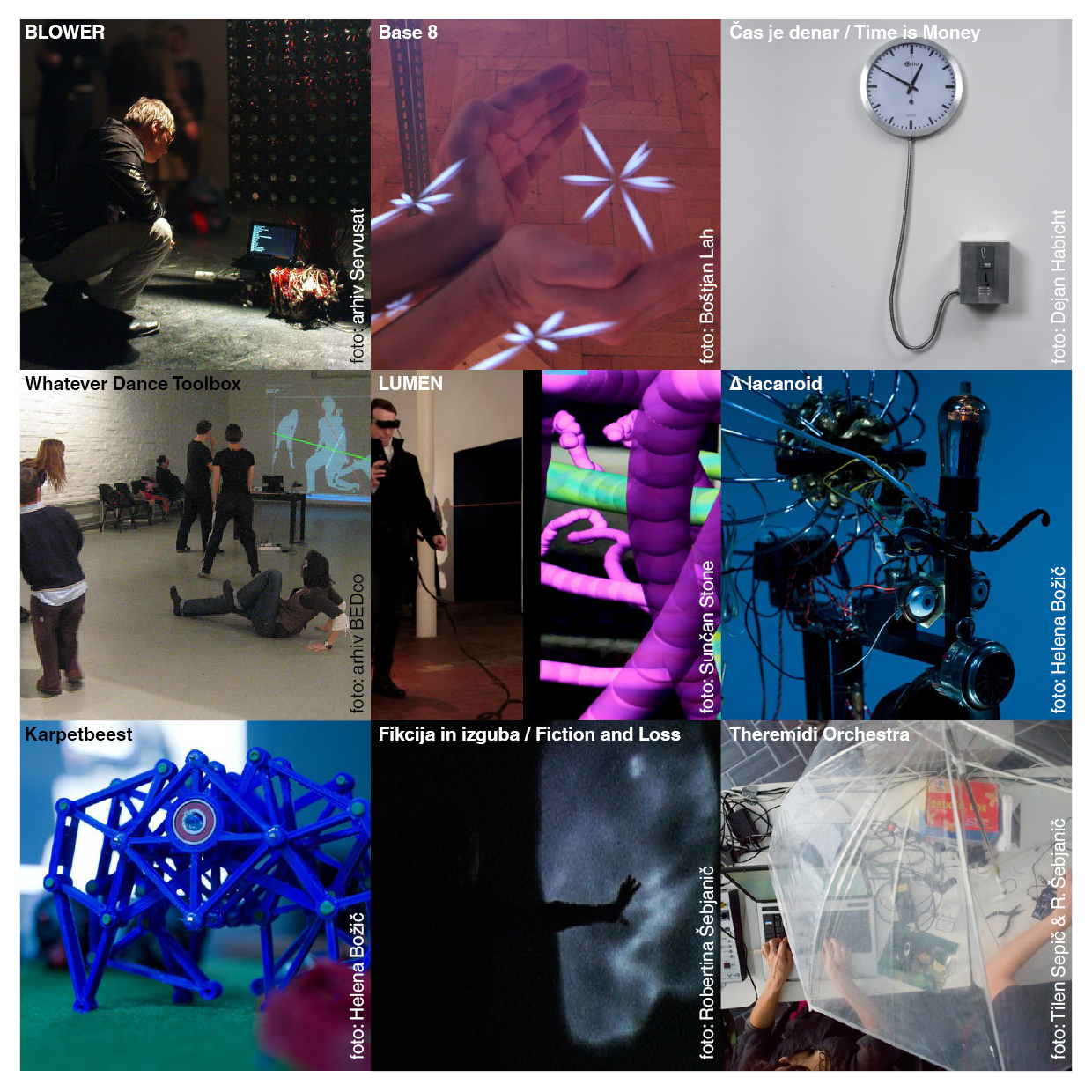 A collage of works featured at the Real Time Settings for Ner[d/ve]s exhibition featuring new media art production by Ljudmila - Ljubljana Digital Media Lab, 2012
A collage of works featured at the Real Time Settings for Ner[d/ve]s exhibition featuring new media art production by Ljudmila - Ljubljana Digital Media Lab, 2012
Cooperation with artists
Ljudmila has cooperated with several artists in finding the best technological solution for their exhibitions or performances. One of the most complex work was accomplished for the two Slovenian project that were presented at the 50th Venice International Biennale of Art in 2003: Žiga Kariž's TERROR=DECOR: ART NOW at the A plus A Slovenian Exhibition Space and the Macrolab project by Projekt Atol Institute, set on the Island of Campalto in Venice lagoon and at the Corderie, within the Individual Systems. In 2010 the project Telebody with contemporary dancers and dramaturgs was developed for the Ukrep - Festival of Dance Perspectives.
Education
Ljudmila organises regular workshops in basic and advanced use of open source software (Blender, Pure Data, MediaWiki), as well as the Free Circuit workshops and Digital Dish public lectures and artist talks by international new media artists. The Prosto-vezje programme in general engages in the experimental ("circuit bending", "tinkering" and "kits") development and making of the electronic circuit hacks based on the free software. The participants are encouraged to develop further uses and include the findings in their artistic work.
Theremidi Orchestra
As a result of a theremin and theremidi physical interface workshop at Ljudmila in 2011 the electronic noise ensemble Theremidi Orchestra was founded in 2011, in collaboration with Borut Savski, Cirkulacija 2. The Theremidi audiovisual public presentations at festivals are usually combined with open workshops for making DIY instruments and gadgets. Today the Ljudmila Art and Science Laboratory offers a programme platform for the Theremidi Orchestra.
Interactivos?’12 Ljubljana
Interactivos is a part of Studiolab, a 3-year international initiative funded by the EC Seventh Framework Programme in 2011, which has developed into a European platform for creative projects that aim to bridge divides between science, art and design. Medialab-Prado, one of the Studiolab core partners, has collaborated with Ljudmila Digital Media Lab and SGMK, Zuerich, in organising Interactivos?'12 Ljubljana dedicated to the theme Obsolete Technologies of the Future. The six projects selected by means of an open call were co-created by more than 30 international guests who participated in an intensive ten-day collaborative prototyping, hackcamp, advanced workshop and social event taking place at Ljudmila lab. The elaborated projects aim to rethink the qualities of outdated technology and make way for long-term, sustainable usage of technology in our environment for the decades to come.
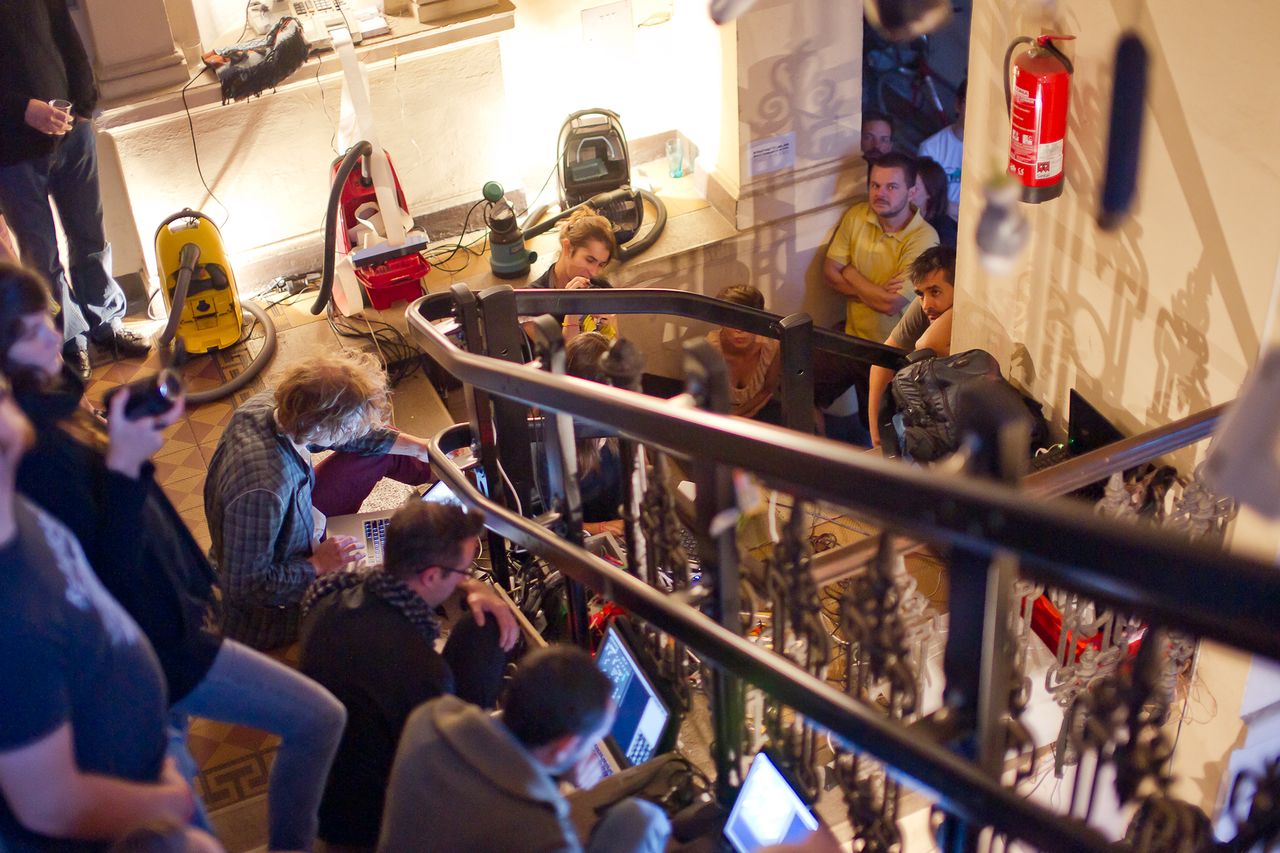 Interactivos?’12 Ljubljana, Domače Volt Orkester, Ljudmila - Ljubljana Digital Media Lab, 2012
Interactivos?’12 Ljubljana, Domače Volt Orkester, Ljudmila - Ljubljana Digital Media Lab, 2012
Artist-in-residence programme
In the context of its Prosto-vezje [Free Circuit] programme Ljudmila every year hosts a resident artist working with new media. One of the first residents was Teresa Almeida from Portugal who presented the interactive Space Dress and Yuga accessories in 2006. The residency in 2009 was produced by Ljudmila and the MoTA Museum of Transitory Art run by CodeEp. Nedine Kachornnamsong (Thailand/Sweden) conducted a research-in-practice with a focus on social interaction, spatial conditions, and tangibility. Recently she has been working on questions related to the possible integration of online representation and experience into a physical environment. During the residency she gave a Digital dish lecture entitled Monitor and Display: An Image of the Ghost in the Machine at Ljudmila, while her Yes/No/Maybe interactive installation and experimental social event (transforming online dating elements into a physical setting) took place at Ljubljana's Moderna galerija (MG). Rob Canning, a composer and sound artist, a member of the GOTO10 collective, presented his projects at the EarZoom Sonic Arts Festival during his Ljudmila residency in October 2010.
In 2011 Ljudmila´s artist-in-residence was Chris Sugrue, an artist and programmer who investigates topics such as artificial life, eye-tracking and optical illusions. In Ljubljana she has developed a project BASE 8, a system that examines the negative spaces between fingers and the motion of hands and arms. It was presented in KIBLA Multimedia Centre, Maribor, and netclub MaMa, Zagreb (Croatia). The latter hosted also the 2012 project by the residents James Powderly and Eun-Jung Son who presented the phenomenon of painting licking in the documentary The Lickers at Tobačna 001 Cultural Centre.
Software and online platforms
In 2003 Ljudmila released Slix, the Linux operating system running live from CD media in Slovenian language. It develops also a Web DataBase Interface (WDBI), compatible with their MediaWiki Improvement project.
During 2001-2006 Ljudmila ran Ljudmilin Informator, a community-based information platform and then started to develop Kulturnik.si, a nationwide aggregator of cultural events (in the frame of M3C Multimedia Centres Network of Slovenia).
Since 2010 Ljudmila Art and Science Laboratory develops and hosts the portal for international cooperation Culture.si and a metasearch engine, both funded by the Ministry of Culture.
Networking
Ljudmila operates through KUD France Prešeren Arts and Culture Association and was a member of the European Cultural Backbone (ECB) initiative and the regional media centres A.Network (together with mama in Zagreb, pro.ba in Sarajevo, and kuda.org in Novi Sad). In 2004 it became a founding member of the M3C Multimedia Centres Network of Slovenia. From 2005 to 2010 it acted also as a public lead for the project Creative Commons Slovenia and was a member of the international networks Creative Commons and Communia. In 2011 this role was passed to the newly established Ljudmila Art and Science Laboratory.
See also
- Ljudmila Art and Science Laboratory
- List of the Multimedia centres Network members
- M3C Multimedia Centres Network of Slovenia
- KUD France Prešeren Arts and Culture Association
- Creative Commons Slovenia
- Kulturnik.si
- Theremidi Orchestra
External links
- Ljudmila website
- Ljudmila promo film
- Ljudmila on the new media centre_kuda.org website
- Frida V. web page
- Luka Frelih at Linuxwochen Linz 2010
- interview with Luka Frelih, the author of Frida V.
- Powered by Ljudmila - exhibition at City Art Gallery Ljubljana in June 2011
- Review of the Powered by Ljudmila exhibition 2011 in Delo Newspaper (in Slovenian)
- Rob Canning - resident 2010
- Cris Sugrue's presentation on ljudmila.org
- Interview with Cris Sugrue, a Ljudmila resident in 2011
- James Powderly & Eun Jung Son - residents in 2012
- INTERACTIVOS?'12 Ljubljana project
- Interactivos?'12 Ljubljana project showcase at Studiolab website
- Related reading
- Andreas Broeckmann: Reflections on Building the European Cultural Backbone, essay on the nonstop-future.org website




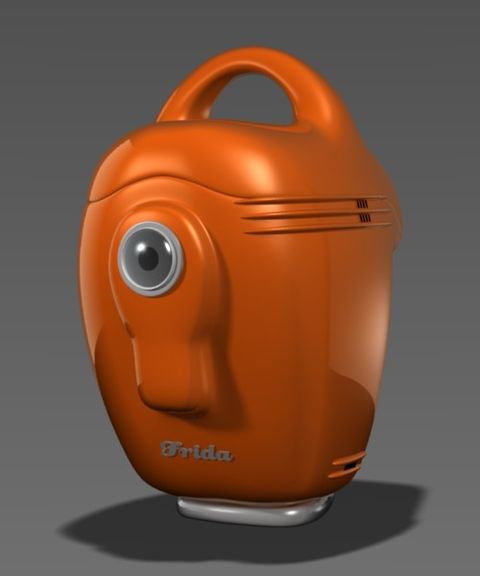
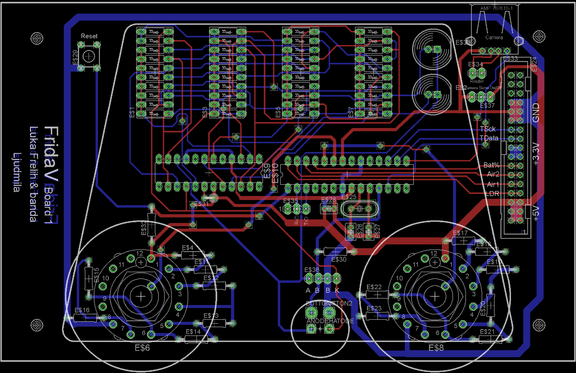
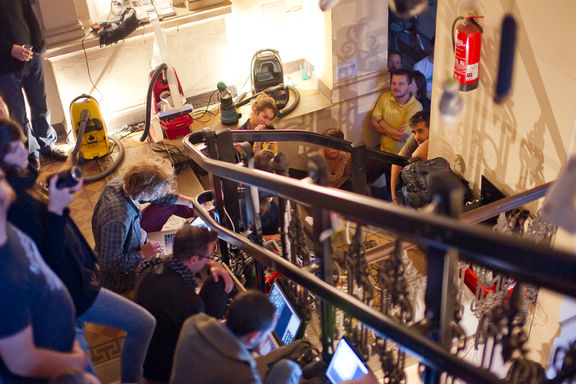
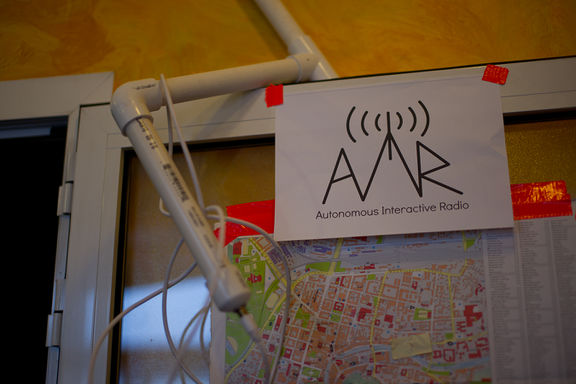
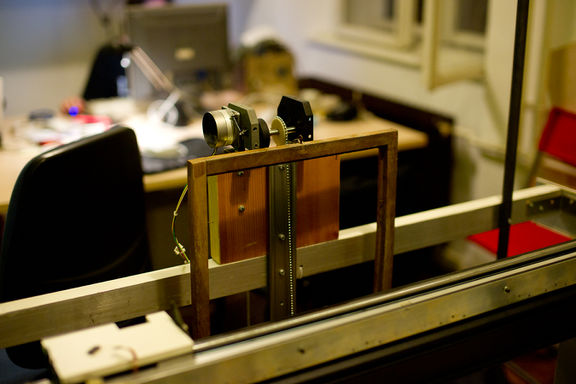
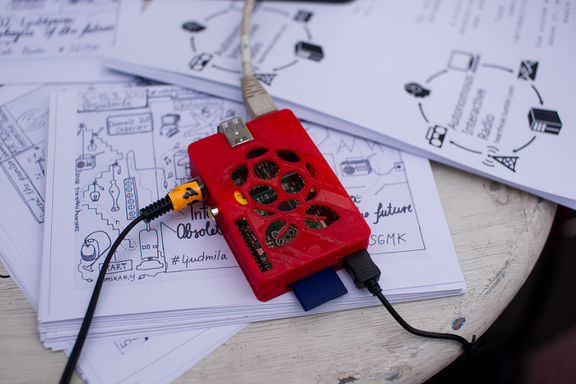
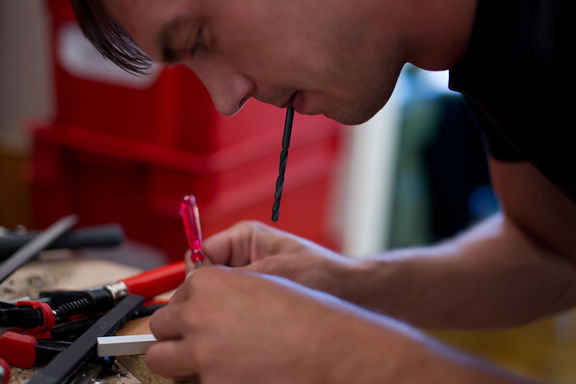
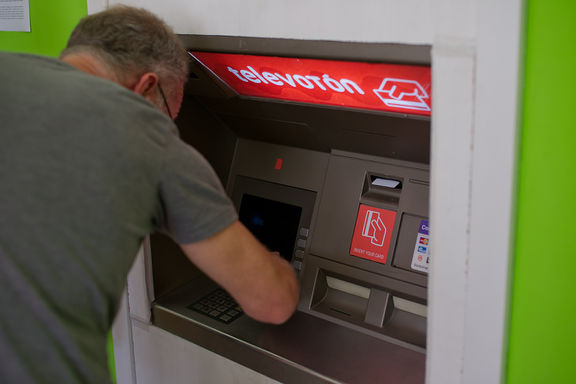
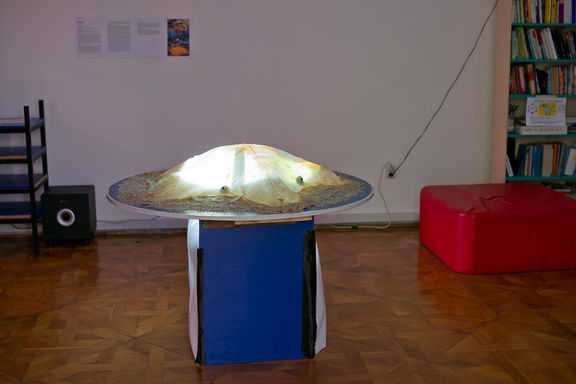
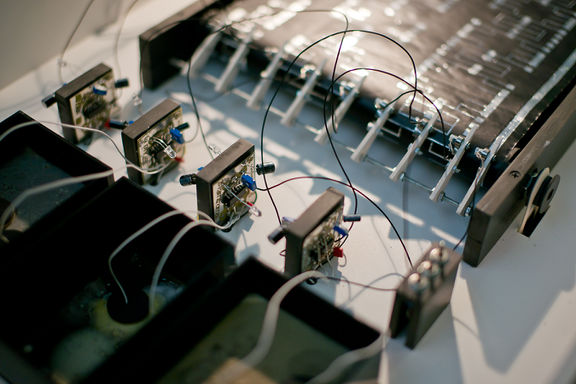
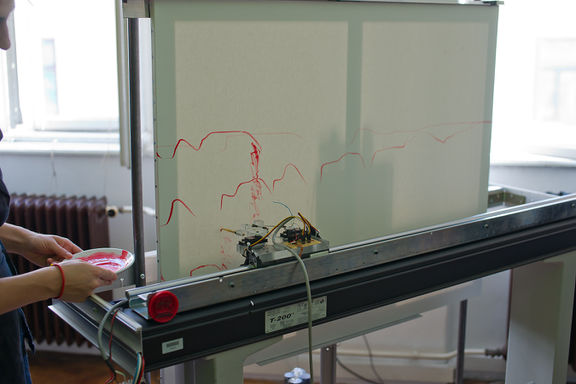
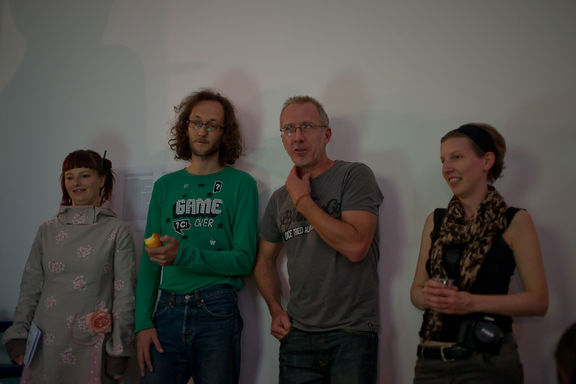
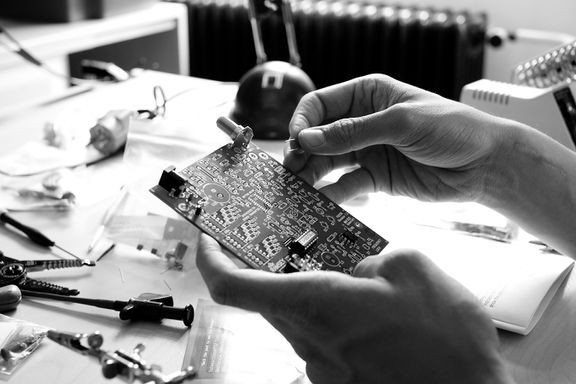
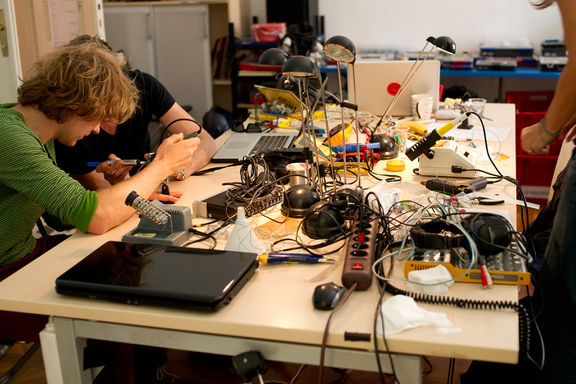
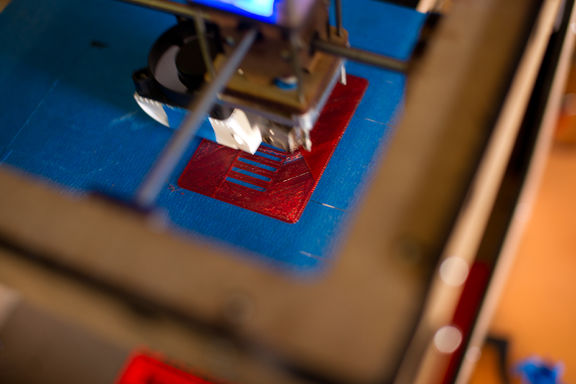
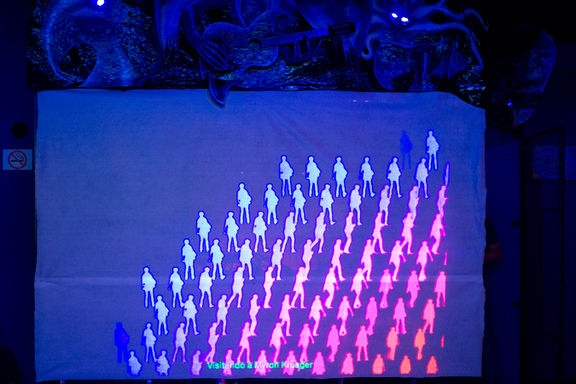
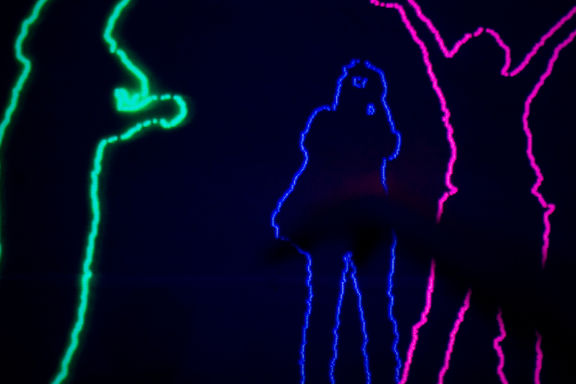
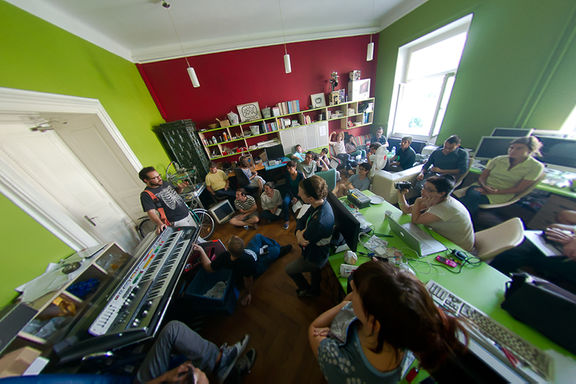
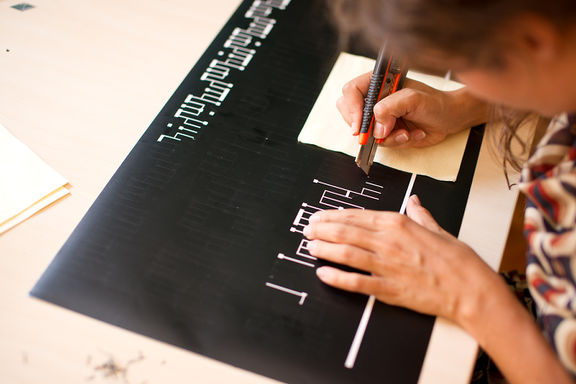
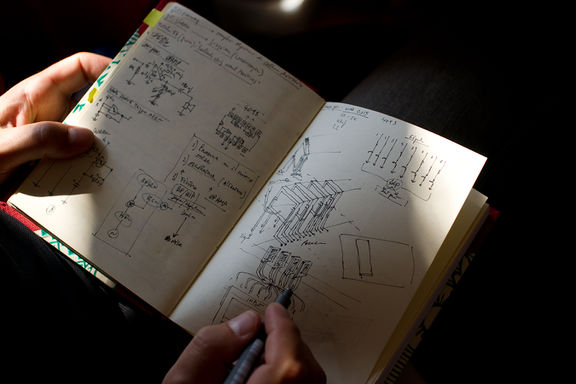
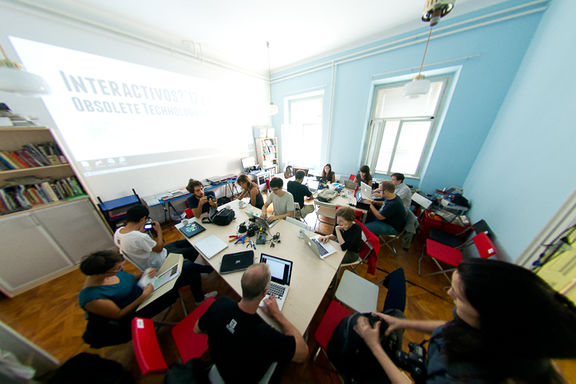
![A collage of works featured at the Real Time Settings for Ner[d/ve]s exhibition featuring new media art production by Ljudmila - Ljubljana Digital Media Lab, 2012](/images/thumb/f/f1/Ljudmila_-_Ljubljana_Digital_Media_Lab_2012_Real_Time_Settings_for_Nerds.jpg/576px-Ljudmila_-_Ljubljana_Digital_Media_Lab_2012_Real_Time_Settings_for_Nerds.jpg)
